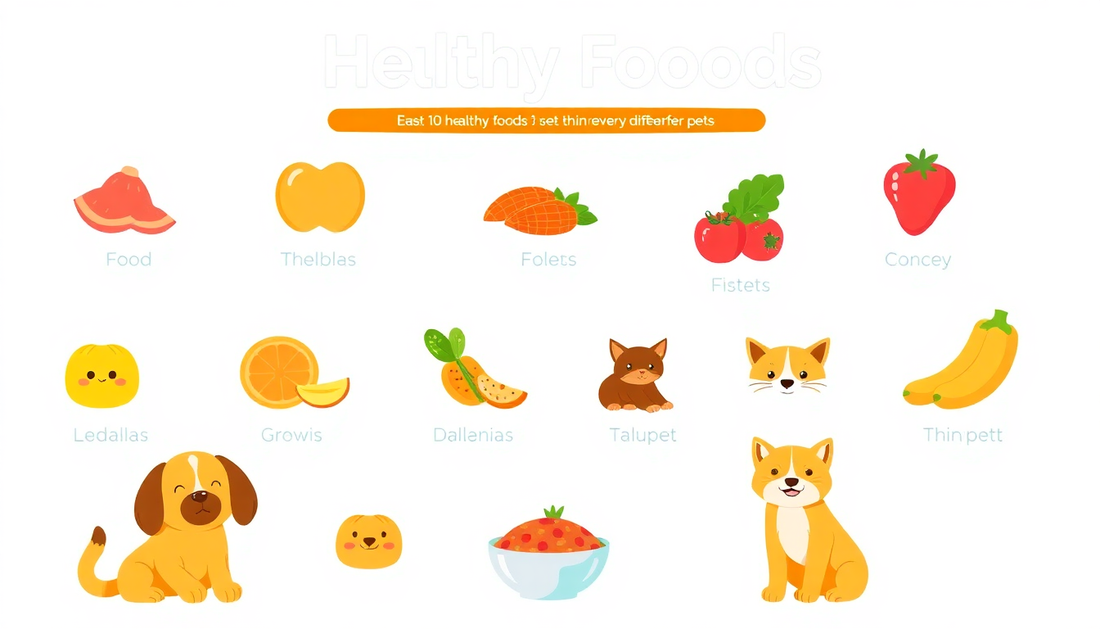
10 Human Foods That Are Actually Good for Pets
Share
As pet owners, we often wonder what human foods are safe to share with our furry companions. While it's generally best to stick to a balanced pet diet, there are certain nutritious foods from our own plates that can actually be beneficial for our pets. In this blog post, we'll explore 10 human foods that are not only safe but can provide valuable nutrients and health benefits for our beloved dogs and cats.
Safe Fruits for Pets
Apples
Apples are a great source of fiber, vitamins A and C, and antioxidants. They can help support digestive health and provide a crunchy, refreshing treat for dogs. Just be sure to remove the seeds and core, as they can be a choking hazard.
Blueberries
These tiny superfoods are packed with antioxidants, fiber, and vitamins that can help boost the immune system and cognitive function in both dogs and cats. Blueberries make a delightful, bite-sized snack.
Watermelon
On a hot summer day, watermelon can be a refreshing and hydrating treat for pets. It's high in vitamins A, B6, and C, as well as the antioxidant lycopene. Just be sure to remove the seeds and rind, as they can cause digestive upset.
Nutritious Vegetables
Pumpkin
Pumpkin is a versatile ingredient that can be beneficial for both dogs and cats. It's high in fiber, which can help regulate digestion, and it's also a good source of vitamins A and C. Pumpkin can be added to your pet's food or used in homemade treats.
Carrots
Crunchy carrots are a great source of beta-carotene, fiber, and vitamins A and K. They can help support eye health and provide a satisfying chew for dogs. Grated or sliced carrots make a healthy, low-calorie snack.
Sweet Potatoes
Sweet potatoes are rich in fiber, vitamins A and C, and antioxidants. They can be a nutritious addition to your pet's diet, either cooked and mashed or baked into homemade treats.
Protein-Rich Options
Cooked Chicken
Plain, boneless, and skinless cooked chicken is an excellent source of lean protein for dogs and cats. It can be a great topper for their regular food or used in homemade recipes.
Eggs
Eggs are a complete protein, containing all the essential amino acids. They can be a healthy addition to your pet's diet, either cooked or raw (for dogs).
Plain Yogurt
Unsweetened, plain yogurt can provide probiotics to support digestive health in both dogs and cats. It's also a good source of calcium and protein.
Healthy Grains and Seeds
Quinoa
This ancient grain is a complete protein and contains fiber, vitamins, and minerals. It can be a nutritious addition to homemade pet food or treats.
Chia Seeds
Chia seeds are packed with omega-3 fatty acids, fiber, and antioxidants. They can be sprinkled on your pet's food or used in DIY treats.
Preparation and Portion Control
When introducing any new human food to your pet, it's important to start with small portions and monitor for any digestive issues or allergic reactions. Proper preparation, such as cooking and removing any bones, seeds, or rinds, is also crucial to ensure safety.
It's generally recommended to limit human food to no more than 10-15% of your pet's total diet. Consult with your veterinarian to determine the appropriate serving sizes and frequency for your individual pet.
Foods to Avoid
While the foods mentioned above can be safe and beneficial for pets, there are many human foods that can be toxic or dangerous. Some common culprits include chocolate, onions, garlic, grapes, raisins, xylitol, and fatty or fried foods. It's important to be aware of these hazards and keep them out of your pet's reach.
If you suspect your pet has ingested a potentially harmful food, contact your veterinarian or the ASPCA Animal Poison Control Center immediately.
Conclusion
Incorporating the right human foods into your pet's diet can be a great way to provide additional nutrients and variety. However, it's crucial to do so with caution and moderation. Always consult with your veterinarian before making any significant changes to your pet's diet.
By understanding which human foods are safe and beneficial for our furry friends, we can enhance their overall health and well-being. Remember, when it comes to pet nutrition, moderation and balance are key.
